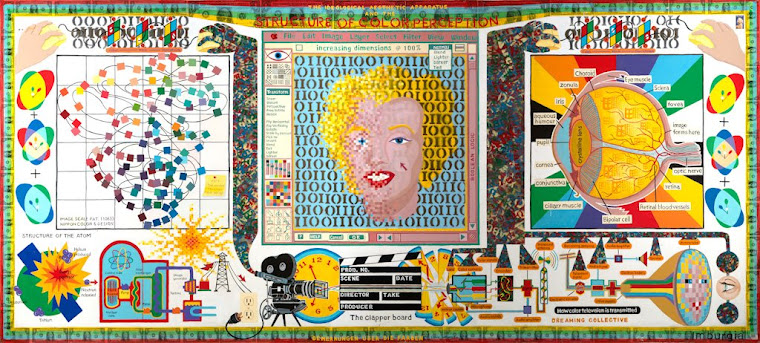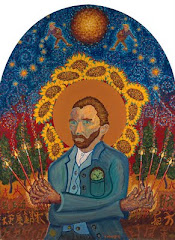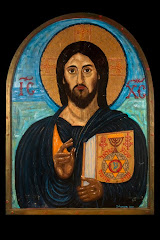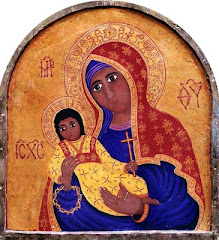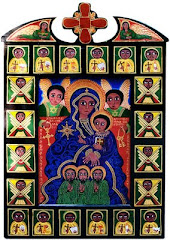 |
| Progeny: My daughter Alyssa and Grand daughter Milly 5 years ago at my last art show. |
“I am a Catholic not like someone else would be a Baptist or a Methodist, but like someone else would be an atheist.” Flannery O’Connor
Klediments:
First a blessing from John O’Donohue (who many of you may know for his work with Anam Cara) for all my many friends who are sick, suffering loss, and grieving.
Beannacht / Blessing
On the day when
the weight deadens
on your shoulders
and you stumble,
may the clay dance
to balance you.
And when your eyes
freeze behind
the grey window
and the ghost of loss
gets in to you,
may a flock of colours,
indigo, red, green,
and azure blue
come to awaken in you
a meadow of delight.
When the canvas frays
in the currach of thought
and a stain of ocean
blackens beneath you,
may there come across the waters
a path of yellow moonlight
to bring you safely home.
May the nourishment of the earth be yours,
may the clarity of light be yours,
may the fluency of the ocean be yours,
may the protection of the ancestors be yours.
And so may a slow
wind work these words
of love around you,
an invisible cloak
to mind your life.”
Let me just write a quick follow up to the posts below and about recent events as plainly as I can. We older folks tend to spend too much time yakking about our illnesses, like old veterans recounting war stories, although these wars are usually fought against our own bodies.
I had a chance to experience something of ‘eyes freezing behind the grey window.’ That somewhat ‘routine’ heart “oblation” surgery I had on thursday came very close to killing me. I am still home recovering and not yet sure what my final condition will be, but there are many reasons to be hopeful. Without realizing it the surgeon burned a hole all the way through my heart, but post-surgery no one knew that I was bleeding internally. In the recovery room I was in increasing pain and kept asking for more morphine but my breathing and heart rate kept declining so the nurses kept refusing. The sack around my heart and then my entire chest cavity was filling with blood. My lungs were collapsing and my heart was being suffocated. It may very well be that my wife saved my life. She opened my gown and made the nurses see my swelling and purple chest and convinced them that that was not normal and they finally called for a doctor. I was watching my breathing, pulse, oxygen, on the monitors as they all fell lower and lower and I thought then that I was dying, and I was. The chaplain was called to administer to me the Last Rites. I wish that I could say that as I was approaching death I had some great spiritual experience to share with y’all, but as these things are reckoned, I didn’t (so no TV or book deals for me). As I wrote below, I have been studying the practice of Japanese Death Poetry. These are poems, usually haiku’s, that a poet writes just before the instant of death when perhaps one’s being inhabits both this world and whatever other worlds there are. I tried as best I could, but I could not compose a single line of poetry. The doctor arrived and ordered me to be immediately intubated (breathing tube) while they tried to figure out what the problem was. As they were waiting for an ultrasound machine the Catholic chaplain arrived and administered to me the Last Rites (they have a special, small, dissolving, communion wafer that is just perfect for someone with a tube down their throat. Sometimes those Roman Catholics really have their crap together!). To be honest all of this is very hazy. I was heavily drugged and in great pain. And although I have no profound near-death experience to recount, I can at least say that I was not angry with God, the doctors, or anybody else. I was afraid but I was not terrified. Maybe that was because of Jesus, maybe it was the Morphine, only God knows. I was very sad for my beloved wife Lynda who was standing next to me and was in such great anguish, and my children who were rushing to the hospital. I remember the doctor saying we don’t have time to take him to the O R and then I saw him pierce the center of my chest with something. Blood gushed out and I remember a nurse saying something like, ‘Gah! that’s a lot of blood!‘ And that’s it.
I have a hunch that this is a very ordinary sort of experience and that thousands die in similar (and others in much more terrible ways) every day. I am no one special. I have read many of the great spiritual works of Christianity and even those of many other religions but at this crucial moment in my life/death it seems that nothing extraordinarily spiritual happened to me. I am home slowly healing. I am sore, a bit depressed, thankful, confused, immensely grateful for my family and friends, sad, discouraged, and I reckon all of this is pretty normal.
I did write this poem this morning though. Of course, technically it’s not a death poem, just a way to try and bring some thoughts to the surface and encounter them.
Extreme Unction
I won’t tell people what to believe anymore
From now on any light that we find
We will have to find together
And when the darkness comes
We must fall together
And break together
This is a cross worth bearing
One another
All those crosses that we build for ourselves
And for others
Are a colossal dead weight that
Not even a Superman could shoulder
It is late in the day
And the damage done
I can not undo
I am completely surrounded by love
But utterly alone
I am helpless
And I despise being a cross
That others must bear
This is my breaking
This is my shame
And my gift
As much as I am resistant to the call of Jesus to “take up my cross,” I find that I am maybe even more resistant to being someone else’s cross. Sometimes we might well prefer the pain and suffering (and the glory and attention) of the suffering servant, to the ignominiousness and humiliation of being the helpless burden needing a diaper change.
Way below I once wrote about how much I respect the work of chaplains. One chaplain in particular wrote about how in all her years of ministry to the seriously ill no one ever wanted to talk about theology or philosophy. My own experiences being with the sick and dying pretty much bears this out. Interestingly though, my good friend and dear brother Johnny V P came to the hospital on the night of my greatest distress with a copy of Heidegger’s “Zollikon Seminars: Protocols - Conversations - Letters.” We had just barely started reading and beginning to discuss it a bit the previous week when I ended up in the hospital. I don’t have any comments on the Zollikon yet but I was reading the book, “The New Heidegger” this morning and came across this interesting citation:
“In the Zollikon Seminars (6 July 1965) Heidegger quotes Wiener’s definition
of the human – a definition he naturally wants to explain historically and chal-
lenge philosophically – as an information device, whose singularity, namely,
language, can be computed and controlled. As we shall see, Heidegger’s
interpretation of the human being, and of its relation to language, is radically
different, if not altogether opposed. According to Heidegger, the human being
is human only to the extent that he ‘understands’ being (as presence), that is,
only to the extent that he stands in the openness of being. Being human means
to be this openness” (Pg 104).
Several things strike me about this passage but let me just focus on that part that states that ‘we are human beings to the extent that we stand in openness to being, and to be human is to be this openness.‘ I very much like this way of expressing our humanness although I can not say that I fully accept it. Yet I think that maybe this close encounter with my mortality has perhaps helped me to dwell in this openness more. Even though I don’t think that we have to suffer to experience more of this openness, I do think that there are all kinds of experiences that may serve to help us towards greater openness to Being (even good old fashioned church-going, sacraments, works of justice, mercy, and charity, etc.) but our frail bodies and mortality confront us in ways that our speculating and intellectualizing about various public policy alternatives, political systems, speculative theologies, etc., often don’t. That is, I can ignore the hellfire drones zipping overhead and the dead Bangladeshi garment workers under the collapsed death-trap of a factory building, but I can’t ignore a hemorrhaging hole in my heart. And just like many of those dead and surviving Bangladeshi women, I now know something of what it feels like to have your breath crushed out of your chest. If that experience can’t move me towards more openness to being, to the Spirit, to Jesus, to others suffering, then what will? I do not deserve life more than they did. Indeed, I think it could be better argued that I ‘deserve‘ life much much less. To be honest I am dealing with a bit of a case of survivor guilt over the recent deaths of so many great brothers and sisters who were such exceptional and talented people, ministers, and servants of God that I keep wondering when God is going to get around to figuring out that the angel of death has been screwing up down here!
Let me end by recommending the new book by Christian Wiman (one of my favorite poets) called “My Bright Abyss,” and by posting one of his unfinished poems:
My Bright Abyss
My God my bright abyss
into which all my longing will not go
once more I come to the edge of all I know
and believing nothing believe in this
God bless y’all and much obliged.




